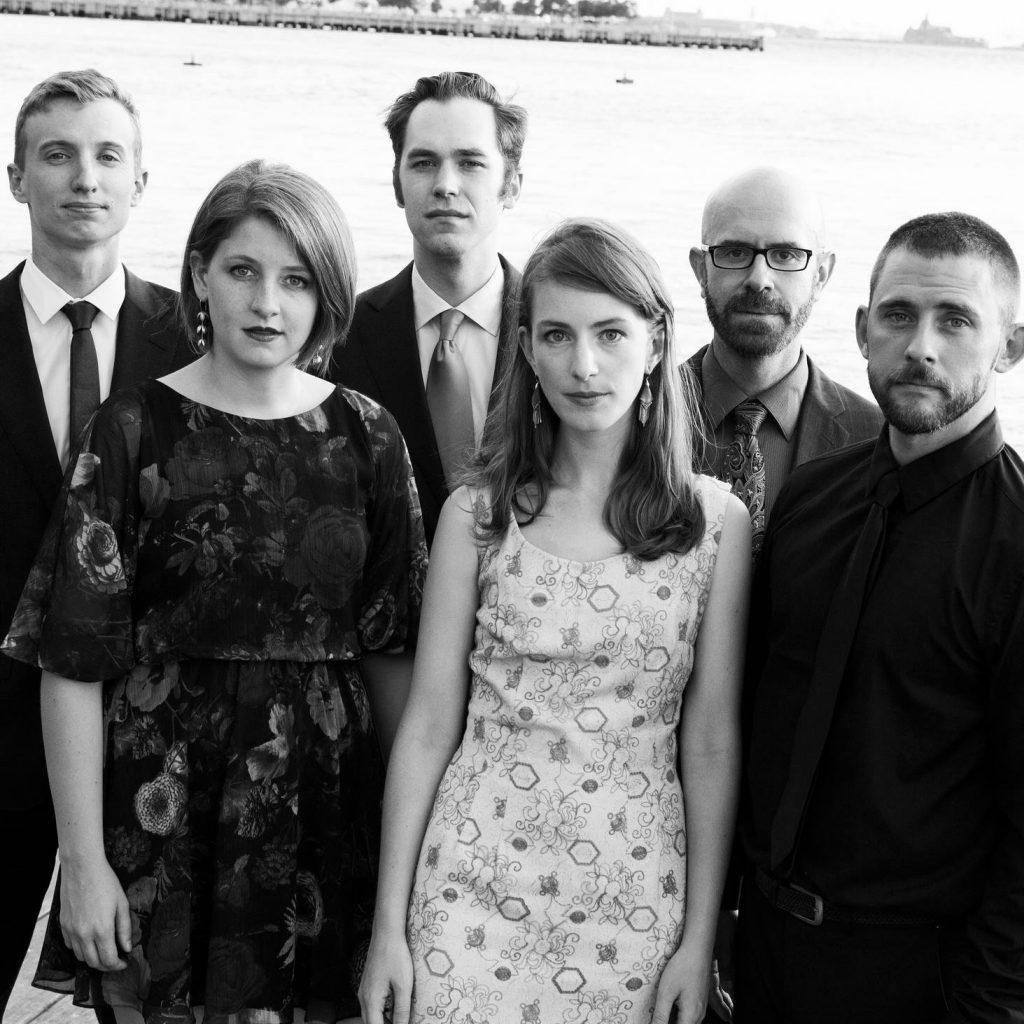Microtonal wonders abound at Ekmeles’ CD release concert

Their very name means “disallowed tones” in ancient Greek. But the new-music vocal ensemble Ekmeles proved to be the gentlest of musical transgressors at its concert Saturday night in the DiMenna Center’s Cary Hall.
The prevailing dynamic in the program’s three pieces (two recently composed for this group) was piano to pianissimo, as the six vocalists wove a delicate tissue of barely audible sung notes, glissandos, yelps, clicks, pops and whooshes—a virtual catalog of the sounds the human mechanism can produce.
At times the pure, vibratoless singing coalesced into gorgeous chords—but from what planet? Ear-bending microtonal harmonies revealed how much music is lurking between the notes of traditional Western scales.
Microphones picked the tiny sounds up and speakers conveyed them the few feet to the audience. The science-fiction art of Ekmeles is, in its essence, part human and part electronic.
The ensemble was celebrating the release of its first CD, titled A howl, that was also a prayer (after a line by John Ashbery) by re-enacting it for a live audience. Admission to the concert included a free copy of the CD, so one could revisit anything on the program at leisure.
The director of Ekmeles, baritone Jeffrey Gavett, both sang with the group and beat the ever-changing meters for his colleagues: soprano Charlotte Mundy, mezzo-soprano Elisa Sutherland, countertenor Tim Keeler, tenor Steven Bradshaw, and bass Steven Hrycelak.
The concert’s tone of otherworldly fantasy was established at the beginning, with Taylor Brook’s Motorman Sextet, a setting of 11 brief chapters from the novel, Motorman by David Ohle, which has a cult following among science-fiction fans.
In the book, seemingly ordinary events unfold, but there’s something odd about it all. “You have patiently endured while the moons were down for repairs,” says a politician to a crowd. At another point, the novel’s protagonist orders farm animals from a catalogue.
In performance Saturday, Gavett and other group members supplied the ordinariness in spoken narration, while Brook’s setting took care of the oddness with an aural kaleidoscope of sung tones and other sounds, executed with pinpoint ensemble. One imagined the author would be intrigued, maybe tickled, by these musical correlatives to the psychic states induced by his book.
The program reached its peak of delicacy and pianissimo in three scenes from the 2008 opera Sleep by Erin Gee, a composer-performer known for her experimental “mouthpieces.” In the scene titled “Abyss,” soft chords in the women’s voices mingled with whistled tones and mouth-percussion sounds from the men.
“Transparency” was a scherzo of rapid staccato singing that melted into sighs and slides. “The Fourth Letter” featured many downward glissandos and floating, finely tuned major thirds from the women. None of this ethereal music, one supposes, would have awakened the opera’s eponymous sleeper.
By comparison, the inflected phrases, interstellar chords and electronic enhancements of Christopher Trapani’s End Words sounded positively robust. The three movements—each a setting of a sestina, a poetic form that links stanzas together by repeating the word at the end of a line—combined live and recorded sounds in ever-changing ways.
The first movement, “They raised violins,” set Anis Mojgani’s poem, rich in nature imagery, with actual birdsong on tape, but also the kind of slick, streamlined singing in chords associated with urbane jazz vocal groups of the 1950s. Sometimes it appeared the live vocalists were singing with themselves in a tape loop.
A technical glitch before the second movement, “you used to,” provided a moment for Gavett to describe Trapani’s composing process to the audience. The singers’ fed-back tones were not a loop after all, but had been painstakingly pre-recorded, one note or sound at a time, then loaded into Trapani’s composing algorithm to produce the accompanying tape.
Under way at last, “you used to” was a fragile collage of live and recorded sounds mirroring the extreme brevity and gentle irony of Ciara Shuttleworth’s poem about love’s disappointments.
In “The Painter,” recorded percussion and synthesizer chimed slowly as the singers declaimed Ashbery’s ironic fable about an artist and his audience. At key moments in the poem, the group’s finely tuned homophony fractured into individual parts, only to come together again a few bars later.
At the music’s close, warm applause acknowledged the ensemble’s technical and expressive feats. While everyone has thought of belting out a few bars of the “Hallelujah” chorus themselves, it’s unlikely anyone present Saturday night imagined duplicating the microtonal wonders they’d just heard.






